Always be my maybe, (not to be confused with the 1995, hit single by Mariah Carey, Always Be My Baby- though the comparison doesn’t go amiss as it is the soundtrack to the film) is the newest movie to be released on the Netflix bill of Rom-coms. Sasha Tran (Ali Wong) is a Michelin star chef who rekindles a relationship with her childhood friend Marcus Kim (Randall Park). The two go on to revisit the reasons for their relationship’s eventual disintegration. The movie goes on to touch on various minute moments of the pair’s American Asian cultures. From the dialogue to the nuanced cultural quirks that many minority ethnic groups can relate to: removing shoes before entering the home and speaking your native language to elders in attempt to no seem “too Westernised”. But beneath the overall character arc’s explored, the fragility of generational guilt is very real and very easy to overlook.
Marcus’s career and ambition is stunted due to a family tragedy and as a result of the incident, he goes on to live a life in the shadow of his father. Joining the family business, not settling down (to the dismay of many a first generational parent) and crippling dependency either from parent or child. During a conversation between, Marcus and his father, regarding his inability to move states to be with the love of his life, he retorts, “I’m your caregiver!” to which his father replies, “What the hell are you talking about” stunned. Now, this may seem like a baseless exchange fueled by Marcus’s insecurity that his failures have been accounted to his trauma, which, yes, a large part of that is a result of trauma; but perhaps unbeknownst to his father, Harry Kim (Saito), the subtle conversations on support have manifested in a child unable to break away from their family in fear of disappointing their parents, or the shame immortalised by their community.

As a first generation, child of im/migration, there’s a continuous mantra that becomes all too familiar the closer you get to true adulthood. As your parents age it becomes clearer that your duty of care is not to be compromised. Throughout your childhood the notion is reiterated. Parents will frequently recall that the absolute height of offence would be the consideration of elderly housing and reveling in a child’s inability to accept their retirement within their home.
For years it’s been a wonder of whether this guilt is family specific, or even culturally specific, but as per the example portrayed on screen, this is a cross-cultural reality- this is also exemplified by children of working class parents. The internalization of one’s parental struggles, be it with status, financial, or even opportunity; the expectation thrust upon first generational children carries distinct psychological burden that can manifest itself by their dependency, their resentment towards their culture and reassert themselves through relationships with others- never really feeling like you can be too attached due to your obligation to family. It should never be the child’s responsibility to ameliorate the tribulations of the parents through hard work and sacrifices, but unfortunately for many of this is an inevitable trait. When Marcus hit back with, “You lost mum! I can’t leave you too” that crippling sense of duty was heart wrenching, yet, validated all that I and many others have felt for years: the need to overextend, overachieve, and exonerate the shortcomings of the parents as retribution.

